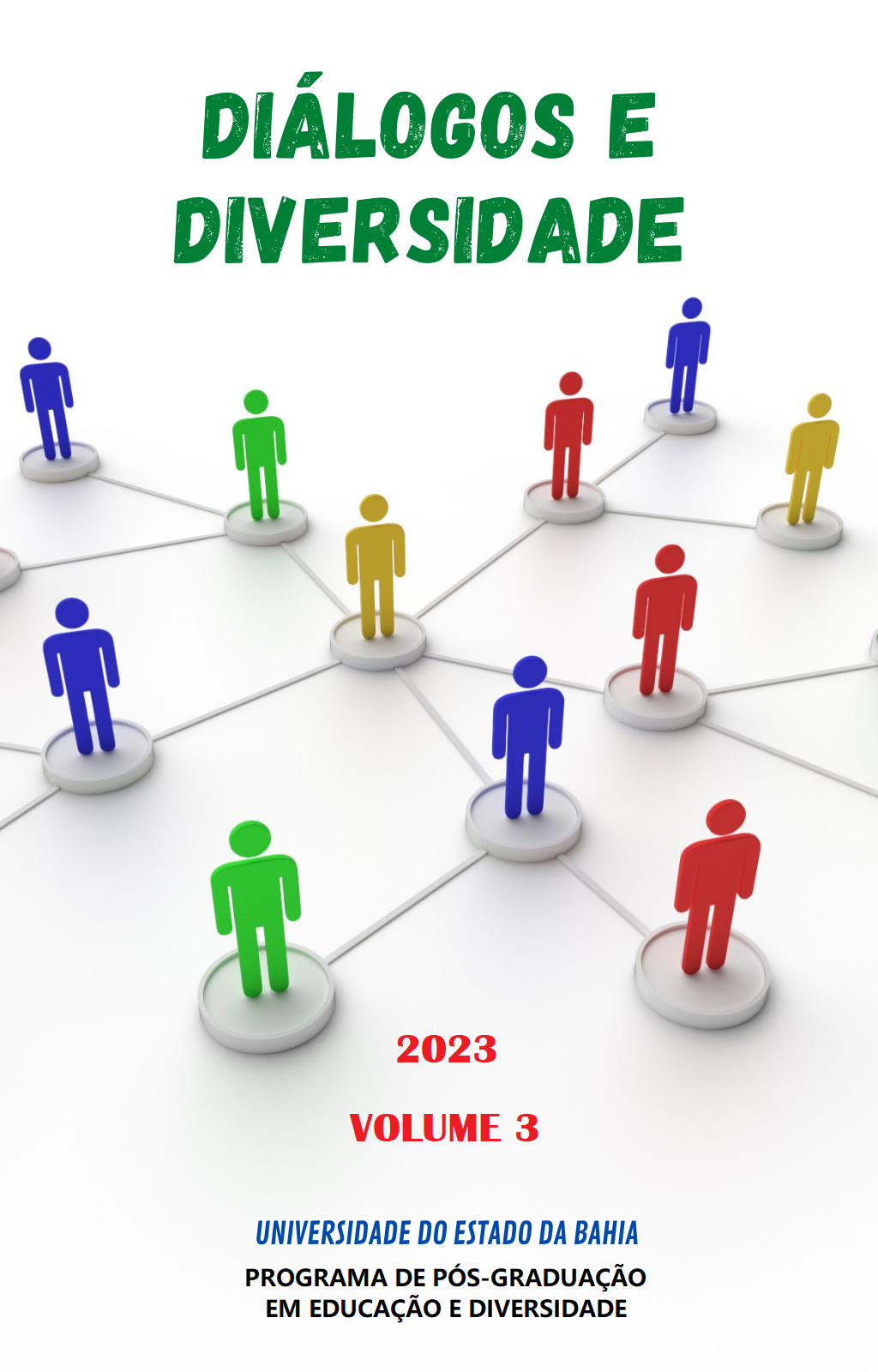MULTIMODALITY INTO THE EFL CONTEXT: FROM THEORY TO PRACTICE
MULTIMODALIDADE NO CONTEXTO DE ILE: DA TEORIA À PRÁTICA
Palabras clave:
Multimodality, digital stories, foreign language learningResumen
Among the many facets of human communication, multimodality seems to have become fundamental in the past few years. The arrival of the internet and different technological tools has brought new possibilities for the use of multimodal activities in foreign language classes, these becoming pedagogical resources that foster the processes of teaching and learning a foreign language in different ways. In this vein, studies on Computer Assisted Language Learning (CALL) have been providing teachers and learners of English as a foreign language with opportunities to experience the creation of digital stories, these being multimodal activities that have the potential to promote foreign language learning (CASTAÑEDA, 2013; TREVISOL, 2019). With this in mind, the present article is aimed at discussing the construct of multimodality within the context of English as a foreign language (EFL) by reflecting on its relevance for language learners and teachers, as well as focusing on the multimodal character and nature of digital storytelling activities in the EFL classroom. By discussing, reviewing, and drawing parallels among some studies in the area of multimodality, the present piece of study suggests that the benefits of making use of digital stories within EFL contexts may go beyond the development of the target language at issue, allowing students to improve some other relevant skills – such as video making, video editing, critical thinking, interpersonal and collaborative learning, and so on – that may be fostered through learners’ engagement in multimodal tasks of digital story creation.
Descargas
Citas
AHMED, M. A. E. S. Using Facebook to develop Grammar discussion and writing skills in English as a foreign Language for University Students. Sino -US English teaching, v. 13, n. 12, p. 932-952, dez. 2016.
BEZERRA, F. Multimodality in the EFL classroom. BELT, Porto Alegre, v.2, n.2, p. 167-177, jul/dez. 2011.
BUCHER, H.J. Understanding Multimodal Meaning Making: Theories of Multimodality in the Light of Reception Studies. In SEIZOV, O.;
WILDFEUER, J. New Studies in Multimodality. 1. ed. London: Bloomsbury Academic, 2017. cap. 5, p. 91-123.
BYGATE, M. Effects of task repetition on the structure and control of oral language. In BYGATE, M.; SKEHAN, P.; SWAIN, M. Researching pedagogic tasks – second language learning and testing. 1. ed. London: Longman, 2001. cap. 12, p. 249-274.
CASTAÑEDAS, M.E. I am proud that I did it and it’s a piece of me: Digital Storytelling in the foreign language classroom. CALICO, v. 30, n. 1, p. 44-62, jan. 2013.
DELATORRE, F.; TREVISOL, J. R. Brazilian learners of English perceptions about oral production on a digital storytelling task cycle. Organon, Porto Alegre, v. 35, n. 68, p. 1-20, 2020. Disponível em: https://seer.ufrgs.br/organon/article/view/100710. Acesso em: 12 set 2023.
ELLIS, R. Task-based language learning and teaching. Oxford: Oxford University Press, 2003.
GONZÁLEZ-LLORET, M.; ORTEGA, L. Technology-mediated TBLT: researching technology and tasks. Amsterdam: John Benjamins, 2014.
HEBERLE, V. M. Multimodal literacy for teenage EFL students. Cadernos de Letras (UFRJ), v. 1, n. 27, p. 1-12, dez. 2010.
HYMES, D. On communicative competence. In PRIDE, J.; HOLMES, J. Sociolinguistics. 1. ed. Hasrmondsworth: Penguin, 1972. cap. 18, p. 269-293.
JAKE, D.S. Capturing Stories, Capturing lives: an introduction to Digital Stories. Illinois, 2009.
LEE, L. Digital news stories: Building language learners’ content knowledge and speaking skills. Foreign Language Annals, v. 47, n. 2, p. 338-356, abr. 2014.
LEVY, M.; HUBBARD, P;. Why call CALL “CALL”?, Computer Assisted Language Learning, v. 18, n. 3, p. 143-149, jul. 2005.
LONG, M. H. Focus on form: a design feature in language teaching methodo- logy. In BOT, K.; GINSBERG, R.; KRAMSCH, C. Foreign language research in cross-cultural perspective. 1. ed. Amsterdam: John Benjamins, 1991 p. 39-52.
MAYER, R. E. Multimedia Learning. 2. ed. New York: Cambridge University Press, 2009.
NGUYEN, A. T. Negotiations and challenges in creating a digital story: the experience of graduate students. Tese - University of Huston, 2011.
NISHIOKA, H. Analysing language development in a collaborative digital storytelling project: Sociocultural perspectives. System, v. 62, p. 39-52, nov. 2016.
PARDO, B. S. Digital Storytelling: A case study of the creation, and narration of a story by EFL Learners. Digital Education Review, v. 26, p. 74-84, dez. 2014.
PRENSKY, M. Digital natives, digital immigrants. On the Horizon: MCB University Press, v. 9, n. 5, p. 1-6, out. 2001.
RODRIGUES, A. L.; SOUZA, K. P.; TREVISOL, J. R. Histórias digitais na aprendizagem de línguas estrangeiras: uma revisão de estudos. Revista Mosaico, v. 21, p. 84 - 104, 2023.
RAZMI, M.; POURALI, S.; NOZAD, S. Digital storytelling in EFL classroom (Oral presentation of the story): A pathwork to improve oral production. Procedia - Social and Behavioral Sciences, v. 98, n. 2014, p. 1541-1544, 2014.
ROCHA, V. D. 2019. Digital stories: Students’ perception of feedback contribution during script development. Master ‘s Thesis. Universidade Federal de Santa Catarina, Florianópolis, 2019. Disponível em: https://repositorio.ufsc.br/handle/123456789/214598. Acesso em: 12 set 2023.
SKEHAN, P. A framework for the implementation of task-based instruction. In BRANDEN, K. V.; BYGATE, M.; NORRIS, J. Task-based language teaching: a reader. Amsterdam: John Benjamins, p. 83-108, 2009.
SORDEN, S. The cognitive theory of multimedia learning, Mohave community college/ Northern Arizona University, 2016.
SWAIN, M. Three functions of output in second language learning. In COOK, G.; SEIDHOFER, B. Principles and practice in applied linguistics. Oxford: Oxford University Press, p. 125-144, 1995.
SWAIN, M.; LAPKIN, S. Problems in output and the cognitive processes they generate: A step towards second language learning. Applied Linguistics, v. 16, p. 371- 391, 1995.
TREVISOL, J. R. Investigating L2 learners production and perception of a cycle of tasks with digital storytelling: an exploratory study in technology-mediated TBLT. PhD Dissertation (Doutorado em Inglês - Centro de Comunicação e Expressão). Universidade Federal de Santa Catarina, Florianópolis, 2019. Disponível em: https://repositorio.ufsc.br/handle/123456789/198996. Acesso em: 12 set 2023.
TREVISOL, J. R.; D’ELY, R. C. S. F. Tarefas & histórias digitais na sala de aula de línguas: efeitos na produção oral em L2. In: OLIVEIRA, D. A.; SILVA, I. T. (org.). Fundamentos e práticas no ensino da língua inglesa: Volume I: Resultados e propostas de pesquisa. Alagoinhas: Bordô-Grená, 2019. p. 79-92. Disponível em: https://5fd55af0-05d2-4627-9691-0c7f536817eb.filesusr.com/ugd/d0c995_ea6fcb10eeaf4061845932936d784bda.pdf. Acesso em: 12 set 2023.
TREVISOL, J. R.; D’ELY, R. C. S. F. Efeitos da implementação de histórias digitais na produção oral de aprendizes de inglês: um estudo embasado em tarefas. ALFA: Revista de Linguística (UNESP online), v. 65, p. 1-20, 2021.
TUMOLO, C. Recursos Digitais e aprendizagem de inglês como língua estrangeira. Ilha do Desterro A Journal of English Language, Literature in English and Cultural Studies. Florianópolis: n. 66, p. 203 - 238, 2014.
TUMOLO, C. Histórias Digitais como recurso para ensino/aprendizagem de inglês como Língua Estrangeira. Estudos Anglo Americanos, n. 43, p. 101-117, 2015.
Descargas
Publicado
Cómo citar
Número
Sección
Licencia
Derechos de autor 2023 Vanessa de Deus Rocha, Matheus André Agnoletto, Juliane Regina Trevisol

Esta obra está bajo una licencia internacional Creative Commons Atribución-CompartirIgual 4.0.
Direitos Autorais
A submissão de originais para a Revista Diálogos e Diversidade (RDD) implica na transferência, pelas(os) autoras(es), dos direitos de publicação. Os direitos autorais para os manuscritos publicados nesta revista são das(os) autoras(es), com direitos da RDD sobre a primeira publicação. As(os) autoras(es) somente poderão utilizar os mesmos resultados em outras publicações indicando explicitamente a RDD como o meio da publicação original.
Licença Creative Commons
Exceto onde especificado diferentemente, aplicam-se à matéria publicada neste periódico os termos de uma licença Creative Commons Attribution-ShareAlike 4.0 International License, que permite copiar e redistribuir o material em qualquer suporte ou formato, adaptar, remixar, transformar, e criar a partir do material para qualquer fim, mesmo que comercial, dando o crédito apropriado, prover um link para a licença e indicar se mudanças foram feitas, distribuindo as suas contribuições sob a mesma licença que o original, não podendo aplicar termos jurídicos ou medidas de caráter tecnológico que restrinjam legalmente outros de fazerem algo que a licença permita.



 Esta obra está licenciada com uma Licença
Esta obra está licenciada com uma Licença 